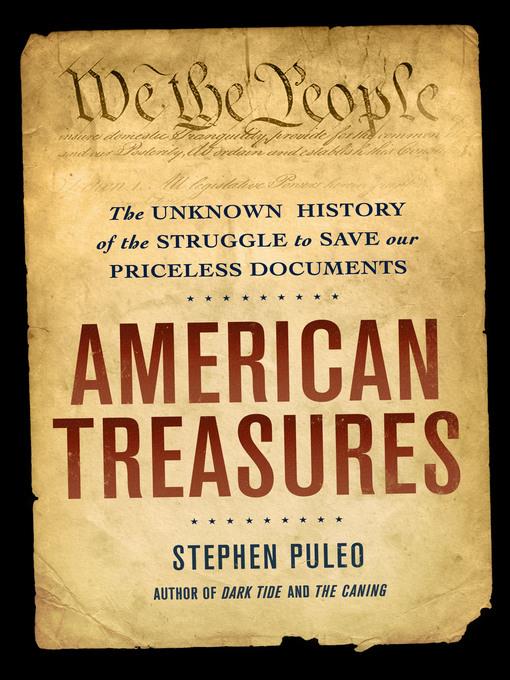
American Treasures
The Secret Efforts to Save the Declaration of Independence, the Constitution, and the Gettysburg Address
کتاب های مرتبط
- اطلاعات
- نقد و بررسی
- دیدگاه کاربران
نقد و بررسی

June 27, 2016
Puleo (The Caning: The Assault That Drove America to Civil War), a historian and former reporter, sets out to trace the creation of America’s founding documents and the later efforts to protect and preserve them. But counter to the book’s subtitle, he spends much of the time on the creation and significance of these historical documents, rather than on steps the government took to care for them as objects. The sections on the Declaration of Independence and the Gettysburg Address offer nothing new for readers versed in American history and do little to add to the self-evident case that these foundational writings of American democracy merit extraordinary protective measures. Most of the sections devoted to those efforts center on the 1941 decision, in the wake of Pearl Harbor, to evacuate select national treasures from the Library of Congress to a secure location away from Washington, D.C. Despite the high stakes and complex logistics, Puleo keeps sight of human fallibility, recounting, for example, the time that a journalist in Lexington, Va., nearly exposed the highly guarded efforts to transport the documents. More such details, and fewer about the Founding Fathers’ debates, would have added up to a better book. Agent: Joy Tutela, David Black Literary.

May 15, 2016
A novel perspective on American history that focuses on the story of the country's founding documents and the Americans who composed, safeguarded, and preserved them for the benefit of future generations.American History magazine contributor Puleo (The Caning: The Assault that Drove America to Civil War, 2012, etc.) concentrates not on the drafting of the Declaration of Independence and other documents but rather their preservation. Near the beginning of World War II, Franklin Roosevelt had requested that Archibald MacLeish, Librarian of Congress, prepare a plan to safeguard the nation's key founding documents. He feared that Hitler would bomb the capital city. MacLeish had to select the documents to protect as well as safe storage sites. That endeavor provides Puleo with a unique frame for a recounting of the history of the physical documents and their continued existence as well as the revered history of their creation. The author's fast-moving presentation combines the familiar stories of their adoption and passage with those of their subsequent production and dissemination. The Declaration of Independence passed on July 2, not July 4, and the official signing didn't take place until a month later. Only after four more months did all the names appear on the copy held by the printer. The author makes it clear not only how dangerous it was to be associated with those awe-inspiring documents, but also how threatened they were. Without the courageous initiative of Dolly Madison, for example, it is doubtful the treasures could have been saved from destruction in the fires set by the British during the War of 1812. The drafting and circumstances of delivery of Abraham Lincoln's Gettysburg Address helps round out the picture. In addition to threats, anniversaries and celebrations continue to call forth efforts to preserve and protect these precious documents from enemies and the passage of time. A solid retelling of an inspiring story.
COPYRIGHT(2016) Kirkus Reviews, ALL RIGHTS RESERVED.

June 1, 2016
Recalling a tale of espionage and suspense with deft detective work, Puleo's (The Caning) latest book tracks the public and private efforts to save such documents as the signed Declaration of Independence, the Articles of Confederation, the U.S. Constitution, and the Gettysburg Address from forces such as the invading British Army that sacked the capital in 1814, the threats of German sabotage and bombings during World War II, and even from years of neglectful management. Much of this work focuses on the efforts of the Library of Congress and the Secret Service to find safekeeping for the nation's founding documents in the First World War, leading to clandestine movements of these vital works to the vaults of Fort Knox and several universities and to an assessment of which documents were essential to validate and preserve the nation's heritage. Puleo also offers informed descriptions of the drafting of the documents and the initial interest and efforts, or the lack thereof, of preserving them. VERDICT An engrossing account of the creation, consecration, and conservation of the documents that defined American democracy. Readers will take away a new appreciation for the vision and savvy of government officials in finding ways to insure such treasures would survive.--Randall M. Miller, St. Joseph's Univ., Philadelphia
Copyright 2016 Library Journal, LLC Used with permission.

July 1, 2016
In the digital age, even a grocery list can be preserved for eternity, so the value of the original versions of most documents is diminished. In our secular democracy, however, certain national documents remain priceless. They are venerated as quasireligious icons. Inscribed on paper, they are subject to the ravages of time as well as the machinations of people who would seize or destroy them. At the outset of WWII, with the Japanese and German militaries running roughshod across Asia and Europe, the threat to these American treasures seemed plausible. Puleo recounts how government officials and a cast of other dedicated experts planned and executed a strategy to protect and transport the Declaration of Independence, the Constitution, and the Gettysburg Address out of Washington, D.C., to a safe, secure haven. On a series of useful and interesting tangents, Puleo describes some of the histories of these documents and the occasional threats they have faced since their creation. This unique, easily digestible, well-researched saga is ideal for general readers.(Reprinted with permission of Booklist, copyright 2016, American Library Association.)

























دیدگاه کاربران